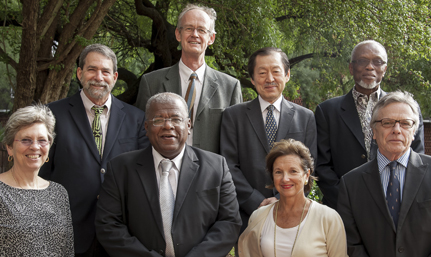Latest News Archive
Please select Category, Year, and then Month to display items
14 October 2025
|
Story Lacea Loader

In the interest of the safety of the staff and students at the University of the Free State (UFS), the Executive Management assessed the current situation on the three campuses and made the following resolutions:
1. The Qwaqwa Campus is closed with immediate effect, and students are requested to leave the campus within the next 24 hours.
2. The Executive Management Committee extends an invitation to the Student Representative Councils (SRCs) of all three campuses to further engagement.
3. On the Bloemfontein and South Campuses, all lectures are suspended until further notice; however, only limited movement will be allowed on campus from 19:00 in the evening until 07:00 in the morning.
Esteemed international Council advises the UFS
2013-03-26
|
 |
|
In front, from the left are: Prof Alice Pell, Vice-Provost for International Relations, Cornell University in the USA; Prof Jonathan Jansen, Vice-Chancellor and Rector of the UFS; Ms Jane Evans, Director of Ntataise Early Child Development Network Support Programme in South Africa; Mr Gert Grobler, Ambassador of South Africa to Madagascar and alumnus of the UFS. At the back, from the left are: Prof Joel Samoff, Professor in African Studies, Stanford University in the USA; Prof Teuns Verschoor, Vice-Rector: Institutional Affairs of the UFS; Prof Masafumi Nagao, Project Professor at the Graduate School for Frontier Sciences, University of Tokyo; and Prof Akilagpa Sawyerr, former Secretary General of the Association of African Universities (AAU), Ghana. Ms Phumzile Mlambo-Ngcuka, former Deputy President of South Africa, was absent when the photo was taken.
Photo: Sonia Small
27 March 2013 |
The International Advisory Council (IAC) of the University of the Free State (UFS) is visiting the Bloemfontein and Qwaqwa Campuses this week as part of its biennial meeting with the university leadership. The Council, consisting of seven leading academics, business leaders and policy makers, are advising the leadership on how well we perform against international benchmarks in research, teaching, service and transformation. The Council also acts as advocates for the university in their own spheres of influence.